-
 Bitcoin
Bitcoin $88,555.6766
1.18% -
 Ethereum
Ethereum $1,626.4043
-1.22% -
 Tether USDt
Tether USDt $0.9998
-0.01% -
 XRP
XRP $2.1018
-1.27% -
 BNB
BNB $605.8750
0.04% -
 Solana
Solana $140.3422
0.04% -
 USDC
USDC $0.9999
0.00% -
 Dogecoin
Dogecoin $0.1643
1.27% -
 TRON
TRON $0.2481
1.05% -
 Cardano
Cardano $0.6359
-1.63% -
 Chainlink
Chainlink $13.3216
-2.53% -
 UNUS SED LEO
UNUS SED LEO $9.1797
-2.79% -
 Avalanche
Avalanche $20.3681
-2.52% -
 Stellar
Stellar $0.2473
-4.43% -
 Sui
Sui $2.3043
2.50% -
 Shiba Inu
Shiba Inu $0.0...01257
-1.15% -
 Toncoin
Toncoin $2.9429
-3.48% -
 Hedera
Hedera $0.1738
0.16% -
 Bitcoin Cash
Bitcoin Cash $347.0587
1.49% -
 Hyperliquid
Hyperliquid $18.2576
-0.35% -
 Litecoin
Litecoin $79.8456
-0.89% -
 Polkadot
Polkadot $3.7809
-4.73% -
 Dai
Dai $0.9999
-0.01% -
 Bitget Token
Bitget Token $4.4439
-0.50% -
 Ethena USDe
Ethena USDe $0.9991
-0.01% -
 Pi
Pi $0.6313
-0.96% -
 Monero
Monero $216.2035
0.57% -
 Pepe
Pepe $0.0...08138
3.46% -
 Uniswap
Uniswap $5.3889
-1.68% -
 OKB
OKB $50.9281
-0.23%
Does Ethereum spot trading support multi-account management?
Ethereum spot trading's multi-account management depends entirely on the platform; while some centralized exchanges offer this, it's not inherent to the Ethereum network itself, demanding careful security practices to mitigate risks.
Feb 27, 2025 at 08:55 pm
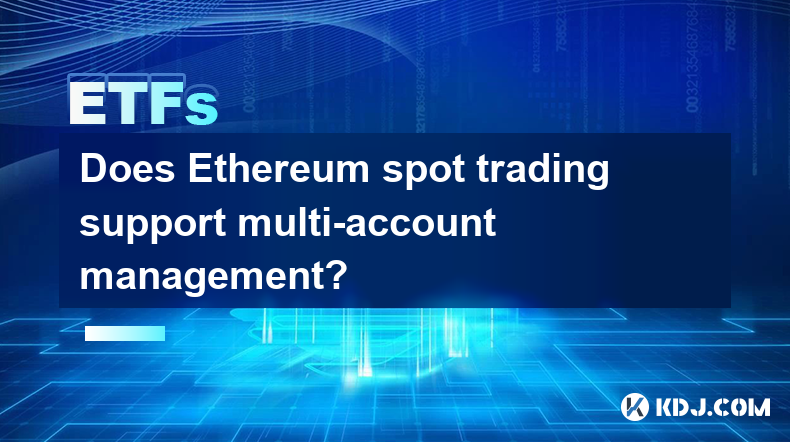
Does Ethereum Spot Trading Support Multi-Account Management?
Key Points:
- Ethereum spot trading, unlike some centralized exchanges, doesn't inherently support multi-account management directly within the Ethereum network itself. The concept of "accounts" on Ethereum is fundamentally different from the account systems used by centralized exchanges.
- Multi-account management for Ethereum spot trading relies heavily on the chosen trading platform and its features. Some exchanges offer multi-account features, while others do not.
- Security and regulatory compliance significantly impact the availability and implementation of multi-account management for Ethereum spot trading. Robust security measures are crucial to prevent unauthorized access and potential losses across multiple accounts.
- The complexity of managing multiple Ethereum addresses and private keys requires careful planning and understanding of best practices to mitigate risk. Improper management can lead to significant financial losses.
- Different approaches exist to achieve the effect of multi-account management, each with its own set of advantages and disadvantages, ranging from using multiple exchanges to employing advanced portfolio management tools.
Understanding Ethereum Accounts and Spot Trading:
- Ethereum's Account System: Ethereum operates on a decentralized, public blockchain. Accounts on Ethereum are essentially cryptographic identities represented by public and private keys. These keys are crucial for accessing and controlling the Ether (ETH) and other tokens within an account. Unlike centralized exchanges with user accounts and logins, Ethereum doesn't have a central authority managing accounts. The responsibility of securing your Ethereum accounts lies solely with the user. Losing your private keys means irreversible loss of access to your funds. The concept of a "multi-account" system on the Ethereum blockchain itself is therefore not directly built-in. Instead, the management of multiple accounts is a user-level task achieved through the careful handling of multiple key pairs.
- Spot Trading on Ethereum: Spot trading refers to the immediate exchange of one cryptocurrency for another at the current market price. This contrasts with derivatives trading, which involves contracts based on future prices. On Ethereum, spot trading predominantly occurs on decentralized exchanges (DEXs) and centralized exchanges (CEXs). DEXs allow peer-to-peer trading without intermediaries, while CEXs act as custodians of user funds, facilitating trading between buyers and sellers. The support for multi-account management varies significantly between these platforms. DEXs often involve interacting with multiple accounts directly through your own wallet, necessitating a higher degree of technical proficiency. CEXs, on the other hand, might offer features to streamline the process, though this functionality is not universally available.
- The Role of Trading Platforms: The availability of multi-account management heavily depends on the specific platform you are using. Some centralized exchanges offer features allowing users to manage multiple trading accounts under a single master account. This might involve creating sub-accounts with different funding, trading strategies, or even for segregation of assets. This centralized approach offers a degree of convenience and organizational benefits. However, this also means that the security of your funds is entrusted to the exchange. On the other hand, decentralized exchanges typically don't offer this feature. Managing multiple accounts on DEXs usually means directly interacting with multiple wallets and addresses, demanding a deeper understanding of Ethereum's technical aspects and security best practices.
Security and Regulatory Considerations:
- Security Implications: Multi-account management introduces additional security challenges. The more accounts you manage, the greater the potential attack surface. Improper key management, weak passwords, or vulnerabilities in the chosen exchange or wallet software can expose your funds to theft or loss. Implementing strong passwords, using hardware wallets for increased security, enabling two-factor authentication, and regularly reviewing transaction history are all critical for mitigating risks. Regular audits of your accounts and security settings are essential, especially when dealing with multiple accounts. Failure to do so can lead to significant financial losses, especially given the decentralized and immutable nature of the blockchain.
- Regulatory Compliance: Depending on your jurisdiction, the use of multiple accounts for cryptocurrency trading may fall under different regulatory frameworks. Some regulations might require specific KYC/AML procedures for each account, while others may focus on the overall trading volume and activity across all your accounts. Ignoring these regulations can lead to penalties and legal repercussions. Therefore, it's crucial to understand the relevant laws and regulations in your region before implementing a multi-account strategy. Understanding tax implications is also crucial; different jurisdictions treat crypto trading income differently, and multi-account management can complicate tax reporting.
Methods for Managing Multiple Ethereum Accounts:
- Using Multiple Exchanges: A common approach is to use different centralized exchanges for different trading strategies or asset classes. This provides a degree of separation and reduces the risk associated with relying on a single exchange. However, this approach necessitates managing multiple accounts and login credentials across different platforms, increasing complexity. It also requires understanding the fees and policies of each exchange, as they can vary significantly. The security of each exchange also needs careful consideration, as a breach on one platform could impact your assets held there.
- Employing Portfolio Management Tools: Several third-party tools and software solutions are designed to simplify the management of multiple cryptocurrency wallets and accounts. These tools can offer features such as automated trading, portfolio tracking, and tax reporting, making it easier to oversee your assets across different platforms. However, it's crucial to select reputable and secure tools, as using untrusted software could compromise the security of your accounts. Thoroughly researching and vetting any third-party tool before using it is essential to ensure the security and reliability of your assets. Understanding the terms of service and the tool's security measures is vital.
- Directly Managing Multiple Wallets: For those comfortable with the technical aspects of Ethereum, managing multiple wallets directly is possible. This involves creating and securely storing multiple key pairs for each wallet. This approach offers maximum control but also necessitates a high degree of technical expertise and caution to prevent loss of funds. Regularly backing up your private keys and utilizing hardware wallets are crucial to prevent irreversible loss of access to your assets. This method requires a deep understanding of Ethereum's security mechanisms and potential risks associated with private key management.
FAQs:
Q: Is it risky to use multiple accounts for Ethereum spot trading?
A: Yes, managing multiple accounts increases the security risk. The more accounts you have, the more potential points of failure exist. Robust security practices, including strong passwords, hardware wallets, and two-factor authentication, are essential to mitigate these risks.
Q: Do all Ethereum spot trading platforms support multi-account management?
A: No. Support for multi-account management varies significantly between platforms. Some centralized exchanges offer features for managing multiple accounts, while decentralized exchanges typically do not. Always check the specific features offered by your chosen platform.
Q: What are the benefits of using multiple accounts for Ethereum spot trading?
A: Benefits can include improved organization of assets, diversification of trading strategies, and potentially easier tax reporting (though this depends on your jurisdiction). However, these benefits must be weighed against the increased security risks.
Q: How can I secure my multiple Ethereum accounts effectively?
A: Use strong, unique passwords for each account. Utilize hardware wallets to store your private keys securely. Enable two-factor authentication wherever possible. Regularly review your transaction history and security settings. Consider using a reputable password manager to help manage your credentials securely. Regularly back up your seed phrases and private keys in a secure location.
Q: Are there any legal implications to using multiple accounts for Ethereum spot trading?
A: Yes, the legal implications depend on your jurisdiction. Some jurisdictions have regulations concerning KYC/AML procedures and reporting requirements for cryptocurrency trading. It is crucial to understand and comply with the relevant laws and regulations in your region. Failure to do so can result in legal penalties.
Disclaimer:info@kdj.com
The information provided is not trading advice. kdj.com does not assume any responsibility for any investments made based on the information provided in this article. Cryptocurrencies are highly volatile and it is highly recommended that you invest with caution after thorough research!
If you believe that the content used on this website infringes your copyright, please contact us immediately (info@kdj.com) and we will delete it promptly.
- Bitget Exploited: Market-Maker Bot Glitch Triggers $100M Trading Frenzy, Turning $VOXEL into a Crypto Storm
- 2025-04-22 16:40:12
- MANTRA CEO John Patrick Mullin announces plans to burn 300 million OM tokens to stabilize market price after recent massive price crash.
- 2025-04-22 16:40:12
- What is Hyperlane? It is a framework for enabling interoperability among different blockchain networks
- 2025-04-22 16:35:12
- Mantra Burns 16.5% of Its Total Supply to Boost Staking Rewards
- 2025-04-22 16:35:12
- Why Is Polygon (POL) Price Up?
- 2025-04-22 16:30:13
- Can Cardano's Triangle Breakout Drive ADA Price Higher?
- 2025-04-22 16:30:13
Related knowledge
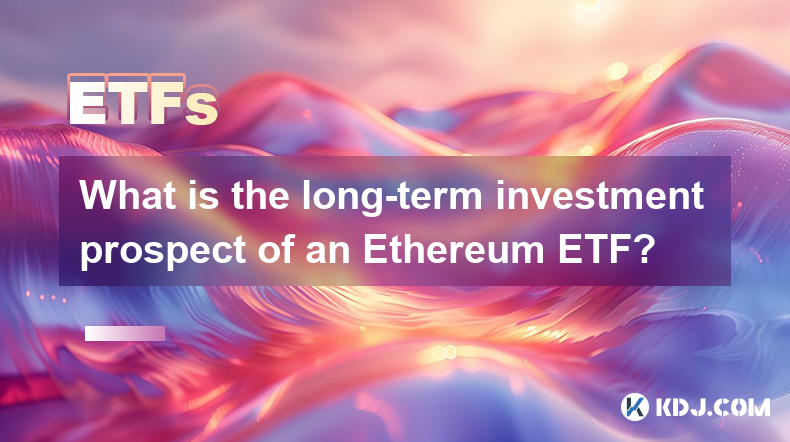
What is the long-term investment prospect of an Ethereum ETF?
Mar 18,2025 at 03:01pm
Key Points:Uncertainty surrounds the long-term prospects of an Ethereum ETF due to regulatory hurdles and market volatility.Approval hinges on regulatory clarity regarding cryptocurrencies, especially concerning investor protection and market manipulation.Successful ETF launches could boost Ethereum's price and adoption, but failure could negatively imp...
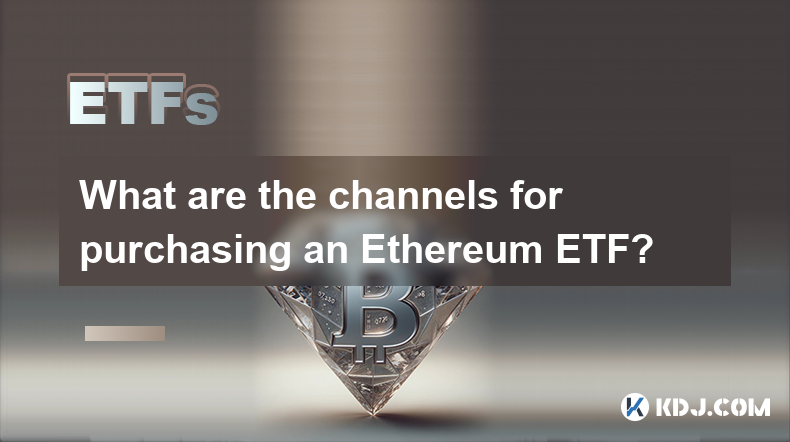
What are the channels for purchasing an Ethereum ETF?
Mar 18,2025 at 01:49am
Key Points:Currently, there are no Ethereum ETFs available for direct purchase by the general public in most major markets.Access to Ethereum exposure through ETFs is limited, mainly through futures-based ETFs.Purchasing Ethereum directly or through other investment vehicles remains a viable alternative.Regulatory hurdles and market complexities signifi...
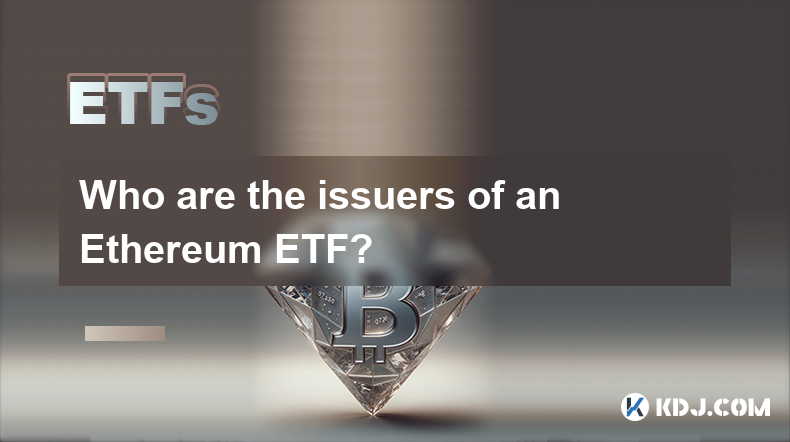
Who are the issuers of an Ethereum ETF?
Mar 19,2025 at 08:07pm
Key Points:There are no currently approved Ethereum ETFs in the US, meaning no single issuer can be definitively named. However, several firms have filed applications.The issuers of potential Ethereum ETFs will be large, established financial institutions, typically asset management companies.The specific requirements for ETF issuers are stringent and o...
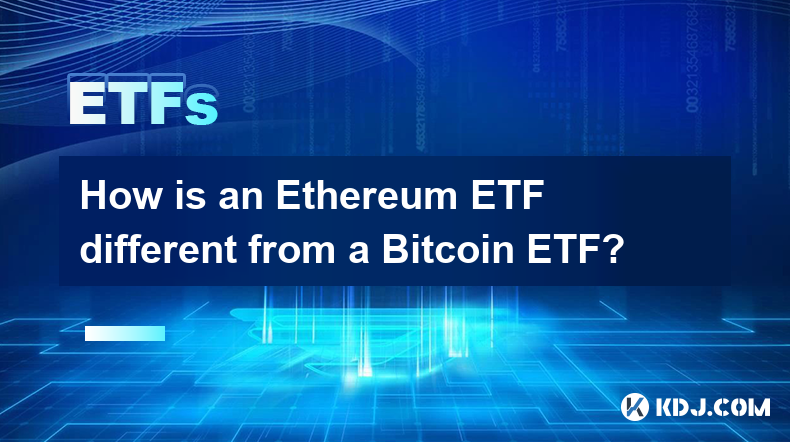
How is an Ethereum ETF different from a Bitcoin ETF?
Mar 17,2025 at 10:55am
Key Points:Underlying Asset: The core difference lies in the underlying asset: an Ethereum ETF tracks the price of Ether (ETH), while a Bitcoin ETF tracks the price of Bitcoin (BTC).Technology and Use Cases: Ethereum's blockchain supports smart contracts and decentralized applications (dApps), creating a distinct technological and investment narrative c...
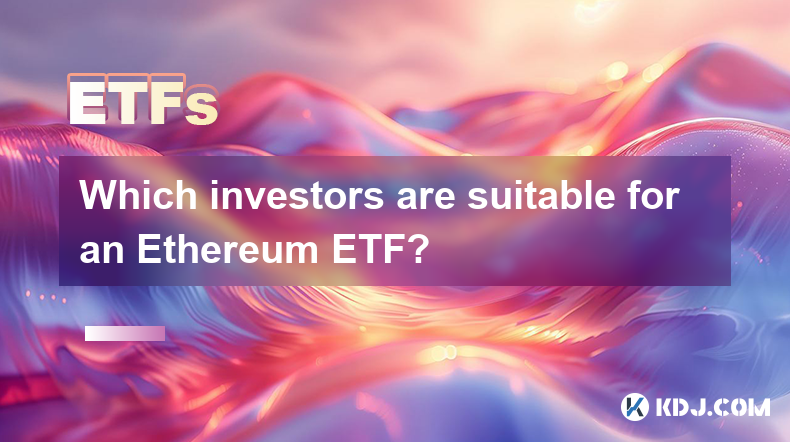
Which investors are suitable for an Ethereum ETF?
Mar 16,2025 at 05:50pm
Key Points:Risk Tolerance: Ethereum ETF investment requires a high risk tolerance due to the volatility of the cryptocurrency market.Investment Goals: Investors seeking long-term growth potential and exposure to the Ethereum ecosystem are suitable candidates.Investment Horizon: A longer-term investment horizon is crucial to weather market fluctuations.U...
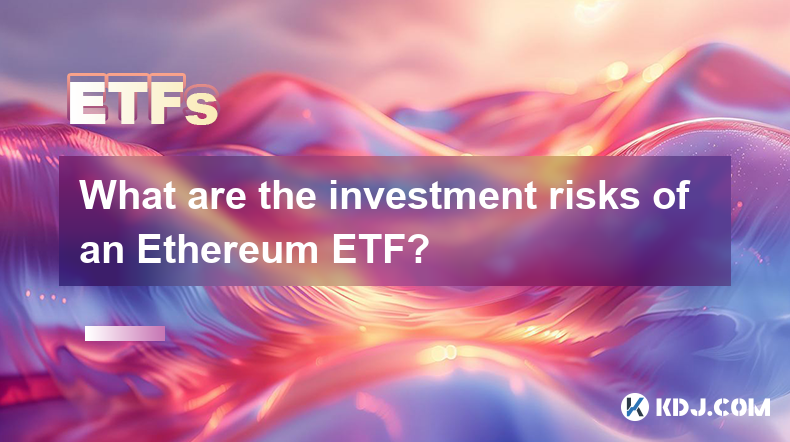
What are the investment risks of an Ethereum ETF?
Mar 18,2025 at 02:12am
Key Points:Price Volatility: Ethereum's price is highly volatile, impacting ETF share prices.Regulatory Uncertainty: Changes in regulatory landscapes can significantly affect ETF trading and performance.Market Manipulation: The potential for market manipulation, particularly in smaller ETFs, exists.Underlying Asset Risk: Risks associated with the Ethere...

What is the long-term investment prospect of an Ethereum ETF?
Mar 18,2025 at 03:01pm
Key Points:Uncertainty surrounds the long-term prospects of an Ethereum ETF due to regulatory hurdles and market volatility.Approval hinges on regulatory clarity regarding cryptocurrencies, especially concerning investor protection and market manipulation.Successful ETF launches could boost Ethereum's price and adoption, but failure could negatively imp...

What are the channels for purchasing an Ethereum ETF?
Mar 18,2025 at 01:49am
Key Points:Currently, there are no Ethereum ETFs available for direct purchase by the general public in most major markets.Access to Ethereum exposure through ETFs is limited, mainly through futures-based ETFs.Purchasing Ethereum directly or through other investment vehicles remains a viable alternative.Regulatory hurdles and market complexities signifi...

Who are the issuers of an Ethereum ETF?
Mar 19,2025 at 08:07pm
Key Points:There are no currently approved Ethereum ETFs in the US, meaning no single issuer can be definitively named. However, several firms have filed applications.The issuers of potential Ethereum ETFs will be large, established financial institutions, typically asset management companies.The specific requirements for ETF issuers are stringent and o...

How is an Ethereum ETF different from a Bitcoin ETF?
Mar 17,2025 at 10:55am
Key Points:Underlying Asset: The core difference lies in the underlying asset: an Ethereum ETF tracks the price of Ether (ETH), while a Bitcoin ETF tracks the price of Bitcoin (BTC).Technology and Use Cases: Ethereum's blockchain supports smart contracts and decentralized applications (dApps), creating a distinct technological and investment narrative c...

Which investors are suitable for an Ethereum ETF?
Mar 16,2025 at 05:50pm
Key Points:Risk Tolerance: Ethereum ETF investment requires a high risk tolerance due to the volatility of the cryptocurrency market.Investment Goals: Investors seeking long-term growth potential and exposure to the Ethereum ecosystem are suitable candidates.Investment Horizon: A longer-term investment horizon is crucial to weather market fluctuations.U...

What are the investment risks of an Ethereum ETF?
Mar 18,2025 at 02:12am
Key Points:Price Volatility: Ethereum's price is highly volatile, impacting ETF share prices.Regulatory Uncertainty: Changes in regulatory landscapes can significantly affect ETF trading and performance.Market Manipulation: The potential for market manipulation, particularly in smaller ETFs, exists.Underlying Asset Risk: Risks associated with the Ethere...
See all articles























































































